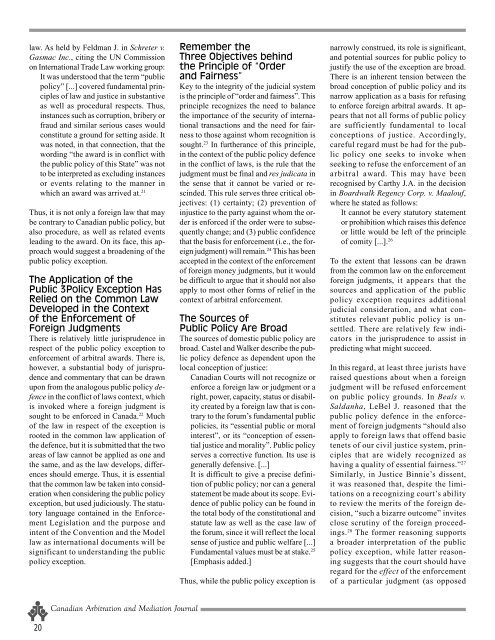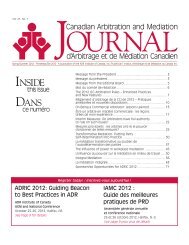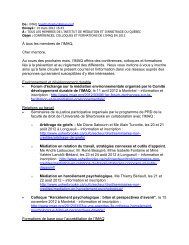law. As held by Feldman J. in Schreter v.Gasmac Inc., citing the UN Commissionon International Trade Law working group:It was understood that the term “publicpolicy” [...] covered fundamental principles<strong>of</strong> law and justice in substantiveas well as procedural respects. Thus,instances such as corruption, bribery orfraud and similar serious cases wouldconstitute a ground for setting aside. Itwas noted, in that connection, that thewording “the award is in conflict withthe public policy <strong>of</strong> this State” was notto be interpreted as excluding instancesor events relating to the manner inwhich an award was arrived at. 21Thus, it is not only a foreign law that maybe contrary to Canadian public policy, butalso procedure, as well as related eventsleading to the award. On its face, this approachwould suggest a broadening <strong>of</strong> thepublic policy exception.The Application <strong>of</strong> thePublic 3Policy Exception HasRelied on the Common LawDeveloped in the Context<strong>of</strong> the Enforcement <strong>of</strong>Foreign JudgmentsThere is relatively little jurisprudence inrespect <strong>of</strong> the public policy exception toenforcement <strong>of</strong> arbitral awards. There is,however, a substantial body <strong>of</strong> jurisprudenceand commentary that can be drawnupon from the analogous public policy defencein the conflict <strong>of</strong> laws context, whichis invoked where a foreign judgment issought to be enforced in <strong>Canada</strong>. 22 Much<strong>of</strong> the law in respect <strong>of</strong> the exception isrooted in the common law application <strong>of</strong>the defence, but it is submitted that the twoareas <strong>of</strong> law cannot be applied as one andthe same, and as the law develops, differencesshould emerge. Thus, it is essentialthat the common law be taken into considerationwhen considering the public policyexception, but used judiciously. The statutorylanguage contained in the EnforcementLegislation and the purpose andintent <strong>of</strong> the Convention and the Modellaw as international documents will besignificant to understanding the publicpolicy exception.Remember theThree Objectives behindthe Principle <strong>of</strong> “Orderand Fairness”Key to the integrity <strong>of</strong> the judicial systemis the principle <strong>of</strong> “order and fairness”. Thisprinciple recognizes the need to balancethe importance <strong>of</strong> the security <strong>of</strong> internationaltransactions and the need for fairnessto those against whom recognition issought. 23 In furtherance <strong>of</strong> this principle,in the context <strong>of</strong> the public policy defencein the conflict <strong>of</strong> laws, is the rule that thejudgment must be final and res judicata inthe sense that it cannot be varied or rescinded.This rule serves three critical objectives:(1) certainty; (2) prevention <strong>of</strong>injustice to the party against whom the orderis enforced if the order were to subsequentlychange; and (3) public confidencethat the basis for enforcement (i.e., the foreignjudgment) will remain. 24 This has beenaccepted in the context <strong>of</strong> the enforcement<strong>of</strong> foreign money judgments, but it wouldbe difficult to argue that it should not alsoapply to most other forms <strong>of</strong> relief in thecontext <strong>of</strong> arbitral enforcement.The Sources <strong>of</strong>Public Policy Are BroadThe sources <strong>of</strong> domestic public policy arebroad. Castel and Walker describe the publicpolicy defence as dependent upon thelocal conception <strong>of</strong> justice:Canadian Courts will not recognize orenforce a foreign law or judgment or aright, power, capacity, status or disabilitycreated by a foreign law that is contraryto the forum’s fundamental publicpolicies, its “essential public or moralinterest”, or its “conception <strong>of</strong> essentialjustice and morality”. Public policyserves a corrective function. Its use isgenerally defensive. [...]It is difficult to give a precise definition<strong>of</strong> public policy; nor can a generalstatement be made about its scope. Evidence<strong>of</strong> public policy can be found inthe total body <strong>of</strong> the constitutional andstatute law as well as the case law <strong>of</strong>the forum, since it will reflect the localsense <strong>of</strong> justice and public welfare [...]Fundamental values must be at stake. 25[Emphasis added.]Thus, while the public policy exception isnarrowly construed, its role is significant,and potential sources for public policy tojustify the use <strong>of</strong> the exception are broad.There is an inherent tension between thebroad conception <strong>of</strong> public policy and itsnarrow application as a basis for refusingto enforce foreign arbitral awards. It appearsthat not all forms <strong>of</strong> public policyare sufficiently fundamental to localconceptions <strong>of</strong> justice. Accordingly,careful regard must be had for the publicpolicy one seeks to invoke whenseeking to refuse the enforcement <strong>of</strong> anarbitral award. This may have beenrecognised by Carthy J.A. in the decisionin Boardwalk Regency Corp. v. Maalouf,where he stated as follows:It cannot be every statutory statementor prohibition which raises this defenceor little would be left <strong>of</strong> the principle<strong>of</strong> comity [...]. 26To the extent that lessons can be drawnfrom the common law on the enforcementforeign judgments, it appears that thesources and application <strong>of</strong> the publicpolicy exception requires additionaljudicial consideration, and what constitutesrelevant public policy is unsettled.There are relatively few indicatorsin the jurisprudence to assist inpredicting what might succeed.In this regard, at least three jurists haveraised questions about when a foreignjudgment will be refused enforcementon public policy grounds. In Beals v.Saldanha, LeBel J. reasoned that thepublic policy defence in the enforcement<strong>of</strong> foreign judgments “should alsoapply to foreign laws that <strong>of</strong>fend basictenets <strong>of</strong> our civil justice system, principlesthat are widely recognized ashaving a quality <strong>of</strong> essential fairness.” 27Similarly, in Justice Binnie’s dissent,it was reasoned that, despite the limitationson a recognizing court’s abilityto review the merits <strong>of</strong> the foreign decision,“such a bizarre outcome” invitesclose scrutiny <strong>of</strong> the foreign proceedings.28 The former reasoning supportsa broader interpretation <strong>of</strong> the publicpolicy exception, while latter reasoningsuggests that the court should haveregard for the effect <strong>of</strong> the enforcement<strong>of</strong> a particular judgment (as opposedCanadian Arbitration and Mediation Journal20
to just the law or procedure behind it).In his concurring opinion in GreatAmerica Leasing Corp. v. Yates, afterconsidering a comprehensive review <strong>of</strong>the law on the question, Borins J.A.stated that the law is unsettled in respectto the circumstances in which thecourt will refuse to enforce a foreignjudgment on the basis <strong>of</strong> a public policyexemption. 29 He declined to decide thecase on that basis where it could bedone without relying on such law.ConclusionThis article reviews seven critical factorsthat will likely affect the conceptualizationand application <strong>of</strong> the public policy exception:(1) discretionary nature <strong>of</strong> the enforcementpower, (2) a court’s ability to raisethe exception sua sponte, (3) arbitralawards are to be enforced “as is”, (4) thepublic policy exception applies to bothsubstantive and procedural law, (5) judiciousreliance on jurisprudence from theanalogous public policy defence, (6) theprinciple <strong>of</strong> order and fairness and (7)broad sources <strong>of</strong> public policy. This list isby no means comprehensive, but serve asguidelines for both arbitrators and litigantsin considering (1) the reliefsought or granted in an arbitral proceeding,(2) whether the matters in disputeor the award granted engages thepublic policy <strong>of</strong> any jurisdiction; (3)whether the public policy exception canbe used as grounds to refuse to enforce theaward, and (4) deciding the appropriate jurisdictionto enforce an award.For good or for bad, the public policy exceptionis a key element <strong>of</strong> the EnforcementLegislature, and may not be arguedonly when other points fail. In respect <strong>of</strong>public policy, the Supreme Court <strong>of</strong> <strong>Canada</strong>said has stated as follows:While memorably described as an unrulyhorse, public policy is neverthelessfundamental to contract law,both to contractual formation and enforcementand (occasionally) to thecourt’s relief against enforcement.” 30[Emphasis in original.]Similarly, the unruly horse <strong>of</strong> public policyis fundamental in the context <strong>of</strong> enforcement<strong>of</strong> foreign arbitral awards and, accordingly,must be understood and appliedcarefully. It is the authors’ hope that thefactors discussed herein will assist in understandingand developing the law andpractice in this regard.1Morgan Fowler and Thomas Gelbman are litigation associates with Osler, Hoskin &Harcourt in Calgary, with experience in commercial arbitration and enforcement proceedings,particularly in the oil and gas context.2For ease <strong>of</strong> reference, in this article, “recognition and enforcement” will be referred tosimply as “enforcement.” For an examination <strong>of</strong> the differences between “recognition”and “enforcement”, please refer to Alan Redfern & Martin Hunter, Law and Practice <strong>of</strong>International Commercial Arbitration, 4th ed. (Toronto: Carswell, 2004) §10-01 to 10-019.3Examples <strong>of</strong> such legislation include, in Alberta: International Commercial ArbitrationAct, R.S.A. 2000, c. I-5; British Columbia: International Commercial Arbitration Act,R.S.B.C. 1996, c. 233; and Ontario: International Commercial Arbitration Act, R.S.O.1990, c. I.9.4The Convention on the Recognition and Enforcement <strong>of</strong> Foreign Arbitral Awards adoptedby the United Nations Conference on International Commercial Arbitration in New Yorkon June 10, 1958; UNCITRAL Model Law on International Commercial Arbitration adoptedby the United Nations Commission on International Trade Law on June 21, 1985. Alberta’sInternational Commercial Arbitration Act is an example <strong>of</strong> Enforcement Legislation thatincorporates both the Convention and the Model Law.5It is also set out in the similar provision in art. III <strong>of</strong> the Convention, ibid.62010 CarswellAlta 949 at paras. 9-11, 2010 SCC 19.7Kaverit Steel & Crane Ltd. v. Kone Corp., 1992 CarswellAlta 226 at para. 49, 87 D.L.R.(4th) 129 (C.A.); ACE Bermuda Insurance Ltd. v. Allianz Insurance Co. <strong>of</strong> <strong>Canada</strong>, 2005CarswellAlta 1935 at paras. 41-43, 2005 ABQB 975; Norsk Hydro ASA v. State PropertyFund <strong>of</strong> Ukraine & ORS, [2002] EWHC 2120 at para. 17 (Eng. Comm. Ct.) [Norsk Hydro].8These grounds include where: (1) a party was under some incapacity or the arbitrationagreement is not valid; (2) the party against whom the award is invoked was not givenproper notice <strong>of</strong> the appointment <strong>of</strong> the arbitrator or the arbitration proceedings or wasotherwise unable to present his case; (3) the award deals with a dispute not contemplatedby or not falling within the terms <strong>of</strong> the submission to arbitration or contains decisions onmatters beyond the scope <strong>of</strong> the submission to arbitration; (4) the composition <strong>of</strong> thearbitral tribunal or the arbitral procedure was not in accordance with the parties’ agreementor the laws <strong>of</strong> the country where the arbitration took place; (5) the award has notbecome binding or has been set aside or suspended; or (6) the enforcing court finds thatthe subject matter <strong>of</strong> the dispute is not capable <strong>of</strong> settlement by arbitration under the law<strong>of</strong> that state: Model Law, supra note 4, art. 36; Convention, supra note 4, art. V.9Redfern & Martin, supra note 2 §10-51.10Supra note 4. It is also set out in art. V(2)(b) <strong>of</strong> the Convention, supra note 4.11Society <strong>of</strong> Lloyd’s v. Saunders, 2001 CarswellOnt 2970 at para. 61, 148 O.A.C. 362 (C.A.)[Saunders cited to Carswell].12Cardozo J. in Loucks v. Standard Oil Co. <strong>of</strong> New York, 224 N.Y. 99 (U.S. N.Y. 1918) at111, cited in Beals v. Saldanha, 1998 CarswellOnt 4295 at para. 65, 42 O.R. (3d) 127(Gen. Div.), rev’d by 2001 CarswellOnt 2286, 54 O.R. (3d) 641 (C.A.), rev’d by 2003CarswellOnt 5101, 2003 SCC 72 [Beals (SCC) cited to Carswell]. See also: Beals (SCC)at paras. 75, 77; Schreter v. Gasmac Inc., 1992 CarswellOnt 137 at para. 50, 89 D.L.R.(4th) 365 (C.J.) [Schreter cited to Carswell]; and Janet Walker, Castel & Walker CanadianConflict <strong>of</strong> Laws, loose-leaf, 6th ed., vol. 1 at §8.6 (Markham: LexisNexis <strong>Canada</strong> Inc.,2005).13Richardson v. Mellish (1824), 2 Bing. 229 at 252.14Schreter, supra note 12 at paras. 15, 47.15May Lu, “The New York Convention on the Recognition and Enforcement <strong>of</strong> ForeignArbitral Awards: Analysis <strong>of</strong> Seven Defenses to Oppose Enforcement in the United Statesand England” (2005 – 2006) 23 Ariz. J. Int’l & Comp. L. 747 at 770; Model Law, supranote 4, art. 36(1)(b); Convention, supra note 4, art. V(2).16Lu, ibid. at 770-771; J. Kenneth McEwan, Q.C. & Ludmila B. Herbst, Commercial Arbitrationin <strong>Canada</strong>, loose-leaf at 12.30.40.30 (Aurora: <strong>Canada</strong> Law Book, 2009).17Norsk Hydro, supra note 7.18Ibid.; Collavino Inc. v. Tihama Development Authority, 2007 CarswellAlta 633 at para.64, 2007 ABQB 212.19The party applying for enforcement is required to provide authentic copies <strong>of</strong> the awardand arbitration agreement, both translated into the <strong>of</strong>ficial language <strong>of</strong> the country in whichthe award is relied on, if necessary: Convention, supra note 4, art. IV; Model Law, supranote 4, art. 35.20Dalimpex Ltd. v. Janicki, 2003 CarswellOnt 1998 at para. 55, 228 D.L.R. (4th) 179 (C.A.).In this case, the Superior Court <strong>of</strong> Justice made a “provisional” judgment enforcing aPolish arbitral award, but provided that the order must be vacated in the event that thearbitral award was set aside by the Polish courts. The Court <strong>of</strong> Appeal concluded that theapplication judge could not make such a provisional judgment.21Schreter, supra note 12 at 49; The commentary on the meaning <strong>of</strong> “public policy” in theModel Law, found in the “Excerpts on the Model Law” from the Report <strong>of</strong> the UnitedNations Commission on International Trade Law on the Work <strong>of</strong> its Eighteenth Session(June 3-21, 1985) at paras. 295 to 297 (published in the <strong>Canada</strong> Gazette, Part I, Vol. 120,No. 40, October 4, 1986, Supp.).22See for example, Schreter, ibid.; Four Embarcadero Center Venture v. Kalen (1988), 27C.P.C. (2d) 260 (H.C.); Beals (SCC), supra note 12; see also Saunders, which contains auseful review <strong>of</strong> the history <strong>of</strong> the consideration <strong>of</strong> the public policy exception, supra note11 at paras. 49-61.23Morguard Investments Ltd. v. De Savoye, 1990 CarswellBC 283 at paras. 41-42, 3 S.C.R.1077 (S.C.C.); Re Cavell Insurance Co., 2006 CarswellOnt 3070 at paras. 38, 40, 269D.L.R. (4th) 679 (C.A.) [Re Cavell cited to Carswell].24Re Cavell, ibid. at paras. 42-43.25Walker, supra note 12 §8.6.261992 CarswellOnt 3368 at para. 6, 6 O.R. (3d) 737 (C.A.). In contrast, in TMR EnergyLtd. v. State Property Fund <strong>of</strong> Ukraine, 2004 CarswellNfld 319 at para. 17, 242 Nfld. &P.E.I.R. 277 (S.C.), Hall J. seemed to broaden the application <strong>of</strong> the public policy considerations,as follows: “It is difficult to conceive that the statute law <strong>of</strong> this Province or thesubordinate legislation made thereunder would not constitute part <strong>of</strong> the “public policy”<strong>of</strong> this Province. Therefore I have no difficulty in concluding that notwithstanding thelimited wording <strong>of</strong> who may apply under Article V <strong>of</strong> the New York Convention to contestrecognition and enforcement <strong>of</strong> a foreign arbitral award, those rights are further expandedby Rule 7.05 <strong>of</strong> the Rules <strong>of</strong> Court, 1986, said Rules being an expression <strong>of</strong> the publicpolicy <strong>of</strong> this Province”.27Beals (SCC), supra note 12 at para. 223.28Ibid. at para. 90.292003 CarswellOnt 4836 at para. 32, 86 O.R. (3d) 226.30Tercon Contractors Ltd. v. British Columbia (Minister <strong>of</strong> Transportation & Highways),2010 CarswellBC 296 at 116, 2010 SCC 4. Perhaps more colourfully, in Enderby TownFootball Club Ltd v. Football Association Ltd [1970] 3 W.L.R. 1021 at 1026 (C.A.), LordDenning stated that “[w]ith a good man in the saddle, the unruly horse can be kept incontrol. It can jump over obstacles. It can leap the fences put up by fictions and comedown on the side <strong>of</strong> justice [...]”.Le Journal canadien d'arbitrage et de médiation21







